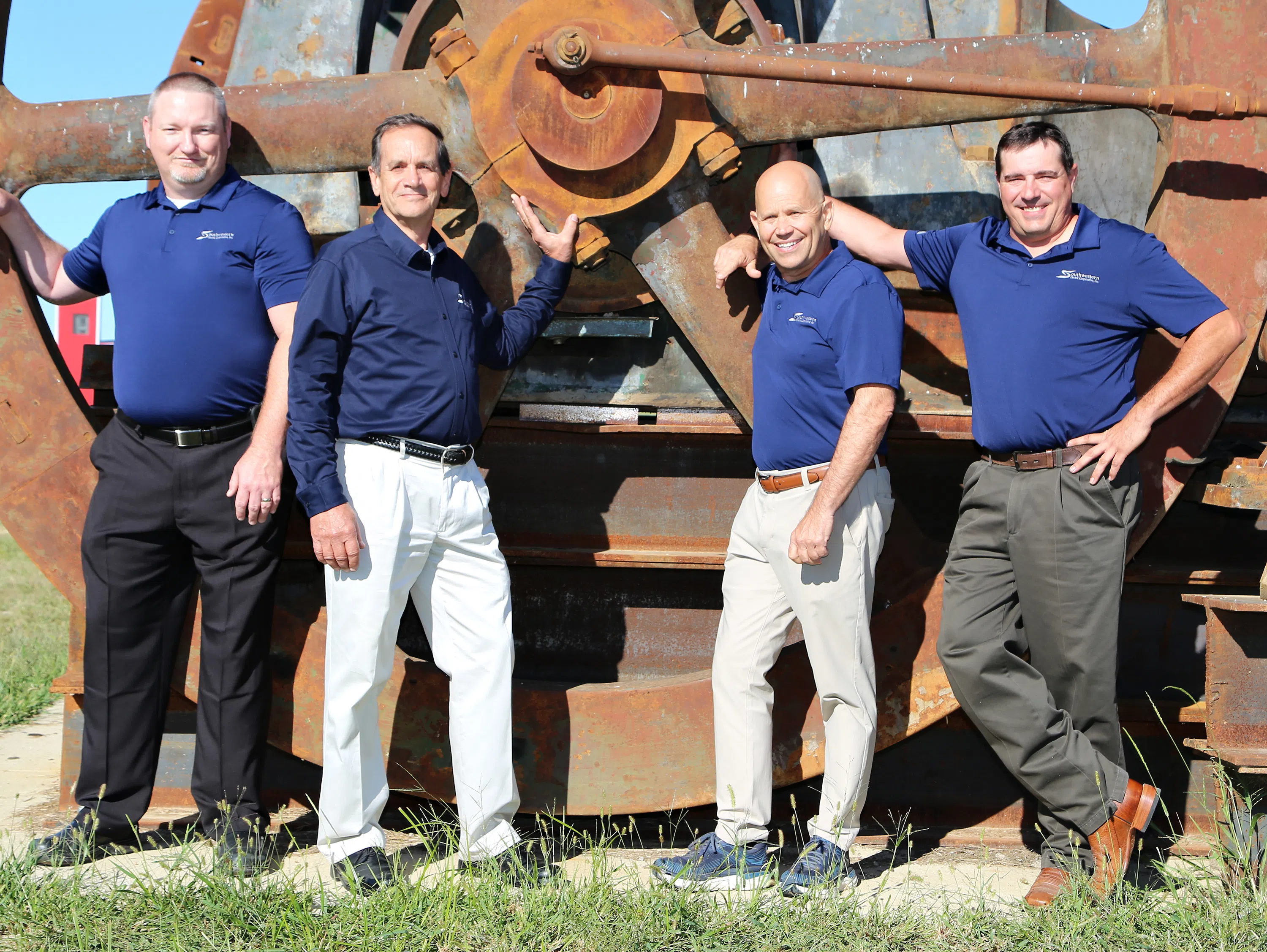
Three members of Southwestern Electric Cooperative were elected to the co-op’s board of directors during Southwestern Electric’s 86th Annual Meeting of Members, held Saturday, Sept. 7, at the American Farm Heritage Museum in Greenville, Ill. Pictured are (l-r) Southwestern CEO Bobby Williams with directors William “Bill” Jennings of Alhambra, Jerry Gaffner of Greenville and Jared Stine of St Elmo. Each director will serve a three-year term on the board.
 Greenville, IL-(Effingham Radio)- The region’s reliance on intermittent energy, a member-oriented strategic plan, and a member-based virtual power plant were among the challenges and opportunities addressed during Southwestern Electric Cooperative’s 86th Annual Meeting of Members, held Saturday, Sept. 7, at the American Farm Heritage Museum in Greenville, Ill.
Greenville, IL-(Effingham Radio)- The region’s reliance on intermittent energy, a member-oriented strategic plan, and a member-based virtual power plant were among the challenges and opportunities addressed during Southwestern Electric Cooperative’s 86th Annual Meeting of Members, held Saturday, Sept. 7, at the American Farm Heritage Museum in Greenville, Ill.
Jerry Gaffner, board president, said early next year Southwestern Electric directors will draft a new strategic plan for the cooperative. The new plan will include a cost-of-service study that ensures the co-op’s billing structure and charges are fair and equitable, an outline for an integrated resource plan that serves the co-op’s growing membership, and a comprehensive review of Southwestern Electric’s energy portfolio. “One part of our strategic plan will not change,” Gaffner said. “We will continue to build on the foundation of service, rates and reliability.”
In January 2025, Southwestern will adjust its service availability charge to reflect higher costs the co-op is paying to build and maintain its distribution system. For residential accounts, the monthly charge will go from $35 to $44. Gaffner said the service availability charge is an investment in poles, wires, transformers, substations, meters, fleet vehicles, office facilities, technology upgrades, and systems that address meter reading, billing, outage management and cyber security.
In total, the investment is responsible for the resiliency of a multimillion-dollar distribution system that includes 3,500 miles of power line, including the lines, transformers and substations that serve each member’s home.
Gaffner commended the cooperative’s employees for their dedication to the membership and their ability to respond to the demands of a rapidly changing power market, and expressed his gratitude to Southwestern Electric members for “building a vibrant, engaged co-op community, 24,000 members strong.”
Southwestern CEO Bobby Williams expressed concerns regarding the availability of baseload, or always-on, energy in the region. On August 26-27, the cooperative asked members to conserve energy during hours of peak demand. “We posted those requests in response to warnings issued by MISO, the Midcontinent Independent System Operator,” Williams said, referencing the organization responsible for managing power supply and demand in much of the Midwest.
“MISO issued those warnings because temperatures were high and the demand for power was coming uncomfortably close to outstripping supply. Our region had to import electricity from other areas to meet demand,” he said. “Wind and solar energy did relatively little to keep the lights on. The vast majority of that responsibility fell on energy generated by natural gas and coal.”
Wind and solar power are intermittent energy, Williams said. “Sometimes they’re robust resources. Sometimes they’re not. Which makes relying on them during periods of peak demand a gamble. That’s a gamble many legislators are willing to make,” he said. “I am not comfortable gambling with our reliability, our economy, and our future. I don’t think you should be, either.”
Williams told members about the growing possibility of preventative or prescribed power outages — often called rolling blackouts — in the Midwest. “We’re shifting from coal-fired, always-on energy to intermittent, green energy. Older coal plants are closing and energy companies aren’t investing in new plants to take their place. They can’t. Legislation has eliminated coal as an option.”
It’s becoming more likely MISO will require utilities — Southwestern included — to interrupt service during periods of extreme heat or cold, Williams said, when the demand for power promises to outpace supply. “We shouldn’t sacrifice reliability and our way of life by relying heavily, or exclusively, on technology that isn’t ready to replace baseload generation,” he said, encouraging members to share their concerns with legislators. “You have a voice. We have a voice. That voice becomes much louder and the message more clear when we speak as a cooperative.”
Acting as a cooperative “is also key to keeping our costs in check,” Williams said, noting that Southwestern had recently decommissioned Freedom Power Station, a natural-gas-fired peaking unit that offset heavy tariffs levied by MISO. “We can mitigate those fees by managing our demand. We can manage our demand with help from you.”
Williams said that as a whole, co-op members manage several megawatts of generation and energy-saving home-based systems. “By strategically timing the use of that technology, we can reduce Southwestern’s impact on the grid. Rather than paying MISO more for our co-op’s demand, we’d prefer to pay you for lowering it,” he said. “That’s what we intend to do.”
Beginning in 2028, Southwestern will offer an incentive rate to members who help the co-op offset its energy requirements during periods of peak demand. “Co-ops employed the same strategy to conserve energy 20 years ago,” he said. “We called it demand-side management. Today we’re addressing the same idea with new terms and technology. In the industry it’s referred to as building a Virtual Power Plant.”
Williams said Southwestern will develop incentive rates that make participating in the program worthwhile for members. “This approach to lowering our demand on the grid will mean hundreds of thousands of dollars in annual savings for Southwestern, and lower rates for those of you who choose to participate. It’s an opportunity for us to achieve together what we can’t accomplish alone,” he said. “But we need your participation to make it a success.”
Southwestern members also elected one member from each of the cooperative’s three voting districts to serve on the co-op’s board of directors. In total, 1,931 Southwestern Electric members registered to vote in the election. All three board candidates were incumbents and ran unopposed. During the business meeting, members approved a motion to elect William “Bill” Jennings of Alhambra (District I), Jerry Gaffner of Greenville (District II), and Jared Stine of St. Elmo (District III) by acclamation. Each director will serve a three-year term on the board.
Based in Greenville, Ill., Southwestern Electric Cooperative is a not-for-profit, member-owned utility serving more than 24,000 residential, commercial, agricultural and industrial members in 11 counties along the I-70 corridor between St. Louis, Mo., and Effingham, Ill.








Comments